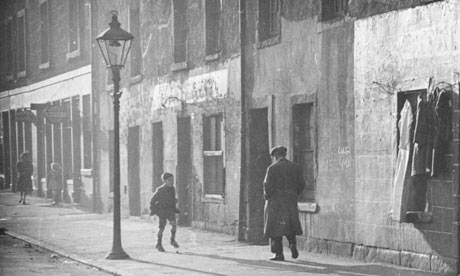
Deft, disturbing and as thoroughly grimy as its 1946 Glasgow setting, Gordon Ferris's The Hanging Shed is the word of mouth hit that is leaving its fellow thrillers in its wake. Topping the Kindle bestseller list ahead of Stieg Larsson and Dan Brown thanks to an early ebook release at Christmas and a growing host of glowing online reviews, the novel is just out in hardback and is every bit as good as its electronic sales of 50,000 and counting would suggest.
It tells the story of Douglas Brodie, a policeman turned soldier turned reporter who is summoned home to Scotland from London to help his childhood friend Hugh Donovan, sentenced to hang for the rape and murder of a boy, a crime he says he didn't commit. The evidence against Donovan is overwhelming – the dead boy's bloody clothing concealed in his flat, even a confession – but, visiting his old friend in prison, Brodie is moved to pity. Burnt and disfigured "as though the skin had run" when his bomber was hit by phosphorus shells, addicted to heroin to handle the pain, Donovan is an anguished shadow of the man he once was, and Brodie decides to start digging.
He teams up with Donovan's advocate, Samantha Campbell, and soon discovers that the so-called proof which is about to see a man hanged is looking increasingly flimsy. But who set Donovan up? The local police force, riddled with corruption and incompetence, and desperate to pin the murder on someone, anyone, to placate an angry public with "the smell of sulphur… in their nostrils"? One of the razor gangs that riddle Glasgow? – maybe even the deadliest, run by the Slatteries, whose crimes are many but whose reach means they have, so far, been above the law?
As Brodie gets closer to the sordid truth, he stumbles ever further into danger – attacked at knifepoint in a filthy pub toilet, thrown from a boat into the freezing Firth of Clyde. But after surviving the battlefields of the second world war and then interrogating the SS about their crimes, Brodie is no stranger to threats and horrors. He decides to take the battle to its instigators in an all-guns-blazing, one-man-takes-on-Glasgow's-most-corrupt finale, discovering someone who "would have been "at home running a Nazi death camp, taking pleasure and pride in his work".
Haunted by the demons of his past, Brodie is an appealingly tortured narrator, as all the best investigators (Rebus, Wallander) are. And Ferris, while never letting the pace slacken, is also a wonderfully evocative writer – "the great marching skies", the "humming darkness" of Scotland, an upwardly mobile accent like "a mutton pie coated in cream", his mother's tiny, cosy home, where the room "tucked itself round us". Brodie reflects at one point: "I truly hadn't expected evil to be a commonplace. That I'd find it here in the soft hills and sandy shores of my own country."
It's the first literary outing for this latest addition to Scotland's proud tradition of fictional sleuths, and if the strength of his debut is anything to go by, we'll be seeing a lot more of Douglas Brodie.

